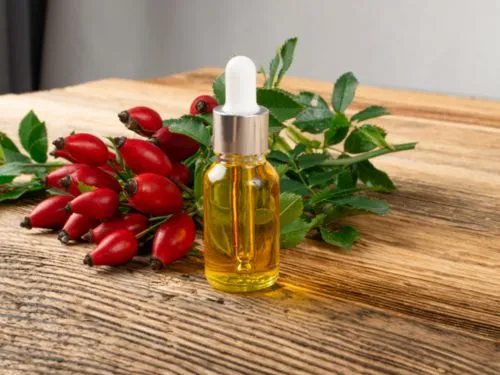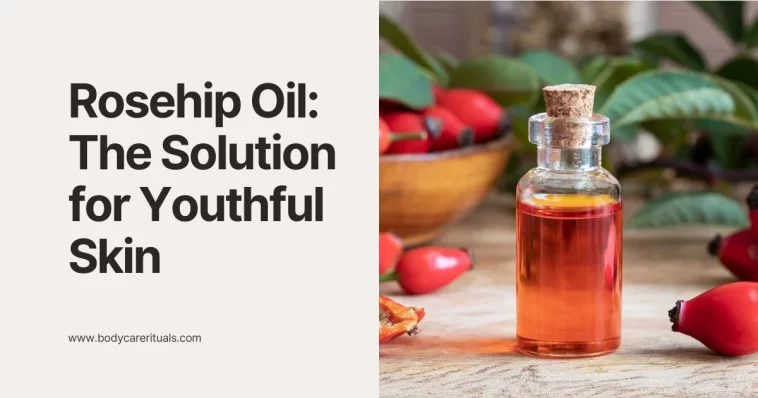Rosehip oil has earned a place in medicine cabinets and beauty editors’ routines alike. It is a lightweight, plant-derived oil pressed from the seeds of wild rose bushes and from the fruit itself. In 2025, interest in rosehip oil remains strong because of a mix of lab research, clinical pilot studies, and widespread consumer reports showing visible improvements in scars, texture, pigmentation, and fine lines.
This guide breaks down how rosehip oil works, what science really says about its wrinkle-reducing powers, and how to use it safely for best results. It also highlights top-rated products and formulations from recent 2025 reviews and expert roundups, helping you choose options that truly deliver smoother, firmer, and more youthful-looking skin.
Why Is Rosehip Oil Studied for Aging Skin
Rosehip seed oil is often called a skincare multitasker for a reason. It’s packed with essential fatty acids, antioxidants, and small amounts of natural vitamin A compounds that nourish and restore the skin. Researchers and skincare formulators are particularly drawn to its key components—linoleic and alpha-linolenic acids, carotenoids, tocopherols, and trace levels of retinoic acid precursors. Together, these ingredients help strengthen the skin barrier, calm inflammation, and gradually promote collagen production, which can lead to smoother, firmer-looking skin over time. It’s this potent yet gentle combination that continues to capture the attention of scientists and dermatologists searching for natural ways to reduce fine lines and combat early signs of aging.
What the 2025 Research Says About Wrinkle Reduction
Recent controlled studies and systematic reviews are more encouraging than the early anecdote-driven coverage. A 2025 pilot study published in a peer-reviewed journal examined topical rosehip oil and reported measurable improvements in facial wrinkles, UV spots, and erythema when used for weeks to months.
The study authors linked these benefits to the bioactive mix of carotenoids and antioxidants in rosehip oil that can both protect against oxidative stress and support tissue regeneration. That does not mean rosehip oil is a replacement for clinical treatments, but the evidence supports its role as a gentle, topical tool for improving the visible signs of aging.
Systematic reviews and expert summaries in 2025 also note that rosehip fruit and seed oils show beneficial effects across a range of skin conditions, from wound healing to wrinkle prevention. These reviews point to consistent signals from both laboratory and small clinical studies that specific rosehip preparations can reduce fine lines and improve skin texture. The consensus among reviewers is that results are gradual, often appearing after several weeks. That rosehip oil works best as part of a broader skincare routine that includes sun protection and evidence-based actives.

How Rosehip Oil May Reduce Wrinkles
There are a few plausible biological pathways that explain why rosehip oil can soften the appearance of fine lines:
- Antioxidant protection. Carotenoids and tocopherols in rosehip oil neutralize free radicals generated by UV and pollution, which slows collagen breakdown.
- Barrier repair. Essential fatty acids help rebuild and strengthen the skin barrier, improving hydration and skin plumpness. Hydrated skin reflects light better and looks smoother, which reduces the visual depth of fine lines.
- Mild retinoid activity. Rosehip oil contains precursors to retinoic acid. These natural vitamin A derivatives may promote cell turnover and collagen production, though concentrations are low compared with prescription retinoids. For people who cannot tolerate retinoids, rosehip oil can be a gentler alternative that supports renewal without the same irritation risk.
Which Skin Concerns Respond Best
Based on 2025 analyses, rosehip oil is most effective for:
- Fine lines and surface wrinkles are caused by dehydration and mild collagen loss.
- Uneven texture and post-acne scarring, where regenerative effects and fatty acids encourage remodeling.
- Pigmentation support when combined with sunscreen and topical brighteners, because antioxidants reduce oxidative triggers.
For deep wrinkles and major collagen loss, medical procedures such as retinoids, lasers, microneedling, or fillers remain more potent options. Rosehip oil is best positioned as a supportive, low-risk ingredient that improves surface quality and complements stronger clinical approaches.
Choosing the Right Rosehip Oil Product in 2025
Not all rosehip oils are equal. Look for these quality markers:
- Cold-pressed and unrefined. Cold pressing preserves carotenoids and fatty acids.
- Seed oil or seed and fruit blends with clear sourcing. Transparency is increasingly common and important.
- Minimal processing and no unnecessary fillers. Single-ingredient oils reduce the risk of irritation.
- Clinical backing or third-party testing, when possible. Some brands publish clinical data or third-party verification for purity.
Recommended Products and Why They Stand Out
Here are topical rosehip oils and blends that consistently appear in 2025 reviews and roundups:
- Trilogy Certified Organic Rosehip Oil. A long-running favorite that has been featured in clinical summaries and public profiles for measurable improvements in fine lines and scars. Its cold-pressed formula and clinical claims make it a reliable entry point.
- The Ordinary 100% Organic Cold-Pressed Rose Hip Seed Oil. A very affordable, single-ingredient option that gives users a straightforward way to try rosehip oil without additives. It receives strong consumer praise for texture and results.
- Pai Rosehip BioRegenerate Oil. A higher price point but formulated specifically for regeneration, it is a favorite among sensitive skin users and shows up often in editorial roundups.
- Radha Beauty Organic Rosehip Oil. A budget-friendly bottle that has attracted large numbers of positive reviews for hydration, texture improvement, and reduced appearance of fine lines. It is often cited in consumer best buy lists.
Smaller indie brands and boutique formulators also produce high-quality cold-pressed rosehip oils. When choosing, prioritize clear labeling, organic certification if possible, and a reputable seller that discloses source and processing methods.
How to Use Rosehip Oil for the Best Wrinkle Reduction
Use rosehip oil in a way that boosts results and reduces irritation risk:
- Night-time application. Apply rosehip oil at night after water-based serums and before heavier creams. The skin repairs best during sleep, and the oil helps seal in moisture.
- Patch test first. Even natural oils can cause reactions. Test behind the ear or on the inner wrist for 48 hours if sensitivity is a concern.
- Layer with vitamin C. Vitamin C supports collagen synthesis and pairs well with rosehip oil. Use a vitamin C serum earlier in your routine and finish with rosehip oil to lock in hydration.
- Do not use with strong retinoids without guidance. Because rosehip contains natural vitamin A compounds, combining it with potent retinoids can increase irritation for some people. Talk to a dermatologist if you use prescription retinoids.
- Consistency matters. Clinical improvements typically appear after weeks to months. Expect gradual smoothing rather than an overnight transformation.
Safety, Pregnancy, and Allergies
Rosehip oil is generally well tolerated. People with known allergies to rose or seed oils should avoid it. Marine and food allergies are not directly related, but checking ingredient labels is essential. For pregnant or breastfeeding people, consult a healthcare provider before using any product that contains active botanical compounds or vitamin A derivatives. When in doubt, choose single-ingredient, cold-pressed formulations and consult a clinician for personalized advice.
Combining Rosehip Oil with Other Anti-Aging Strategies
Rosehip oil is most effective when it supports other evidence-based habits:
- Sun protection. Sunscreen is the single most important anti-aging step because UV exposure drives collagen breakdown. Use broad-spectrum SPF daily.
- Topical proven actives. Retinoids, peptides, and stable vitamin C serums have stronger evidence for stimulating collagen. Rosehip oil complements these and helps with hydration and soothing.
- Lifestyle basics. A balanced diet, sleep, hydration, and avoidance of smoking all support skin repair and minimize collagen loss.
- Professional treatments. For deeper wrinkles, consider in-office procedures and use rosehip oil afterward as part of the aftercare routine to support healing.
Realistic Expectations and What Rosehip Oil Will Not Do
Rosehip oil is not a miracle cure. It does not replace medical interventions for deep expression lines or significant volume loss. Instead, it is a gentle, evidence-supported topical that improves hydration, texture, and the appearance of mild to moderate fine lines. Expect modest but visible gains when used consistently, especially in combination with sunscreen and complementary skincare.
Shopping Checklist and Formulation Tips
When selecting a rosehip oil, choose:
- Cold-pressed, seed or seed and fruit blend label.
- Organic certification, where possible.
- Single ingredient or minimal ingredient list.
- Clear sourcing and a reputable brand.
- Reasonable packaging, such as dark glass bottles, is used to protect carotenoids from light.
Powdered or encapsulated rosehip extracts are also available and are sometimes included in serums and creams. These can be effective if the formulation preserves active components.
A Gentle, Science-Supported Ally for Wrinkles
By 2025, the body of evidence around rosehip oil has grown beyond anecdote. Clinical pilot studies and systematic reviews consistently show that topical rosehip preparations can improve fine lines, texture, and post-inflammatory marks when used over time. The oil’s mix of essential fatty acids, antioxidants, and natural vitamin A precursors supports skin barrier repair and mild regenerative signaling. It is not a replacement for stronger clinical interventions. Still, it is a low-risk, natural option that works well alongside sunscreen, vitamin C, retinoid therapies where appropriate, and sensible lifestyle choices. For those seeking a gentle, nourishing route to smoother skin, rosehip oil remains a reliable staple in 2025 routines.



